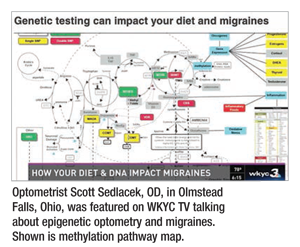

For most of her life, Anna Hopkins, OD, of Lancaster, Ohio, suffered from migraines. “A health center doctor in college was the first one who mentioned that certain foods might be triggering the migraines. He told me to keep a food diary, but it took me 20 years to figure it out.”
The migraines stopped with menopause, so Dr. Hopkins began reintroducing some of those foods—such as bacon—into her diet. “I was recently diagnosed with high blood pressure, and that didn’t make sense to me because I’ve never had that.” In the meantime, she underwent a noninvasive genetic test, a cheek swab that mapped her methylation pathway. The results shouldn’t have surprised her. All the foods that she suspected triggered her migraines were identified as problem foods for her. “If these foods triggered migraines, why was I surprised that reintroducing them was manifesting itself as high blood pressure?” Once she readjusted her diet, she’s been medication-free. “As long as I stay away from things like ham sandwiches and pepperoni pizza, I’m good,” she says.
She decided to introduce the option for genetic testing for her patients with chronic pain, such as migraines and other conditions that result from an inflammatory process. “I’ll see how receptive they are when I say that what we eat can make a difference in how our bodies work. I have brochures and posters in the office, and if someone seems interested, we’ll talk about it more,” she says.
She says she has had some impressive results. The wife of a patient with age-related macular degeneration (AMD) said that her husband’s dementia was progressing and the doctors had started him on medications. Because of his dry eye and AMD, Dr. Hopkins recommended some ocular vitamins and the genetic testing. “When he came back in, he was doing much better, and the results of the genetic testing showed that he needed more D3,” she says. The couple had stopped going outside because of his communication issues, and the lack of exposure to sunshine exacerbated the deficiency. “The most recent time I saw him, he drove himself in. He was a different person, and we were communicating without going through his wife. I would have been hard-pressed to say that he had dementia,” she says.


She explains it to patients, saying that the body is “like an assembly line. If you are missing parts or adding pieces that do not fit, it won’t produce what it is supposed to produce very effectively. When poor food choices are made, it leads to chronic inflammation, among other things.”
Dr. Hopkins says that in her 26 years of practice, she has been a big believer in letting patients talk. “I take a very complete history, and I feel that I get a pretty good overall view of the patient’s health. It’s important for me to know what problems they’re dealing with,” she says. While genetic testing is not a major part of her practice, it is an important component that she can offer, especially to those patients who struggle with some condition.



